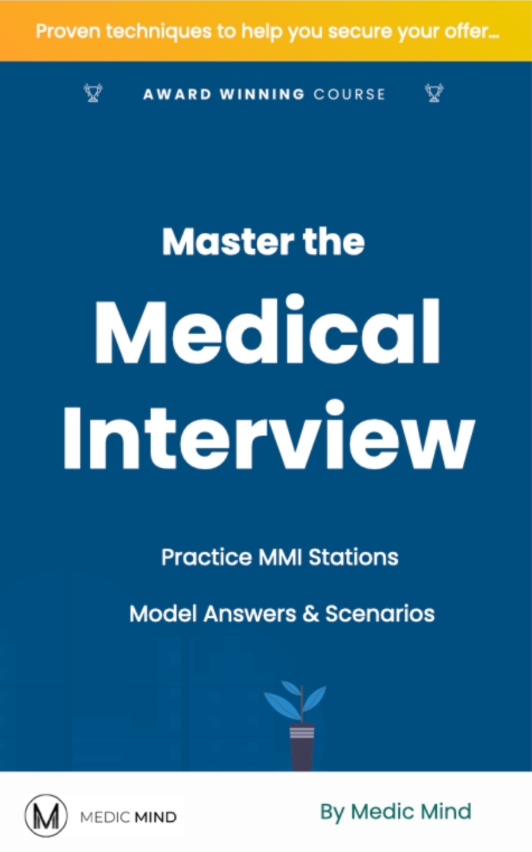It takes a lot of effort even to get an interview offer at Oxford or Cambridge, but it is also no secret that the interview is one of the toughest aspects of the medical application a prospective medical student may have to face. Nevertheless, there are many things you can do to get ready to ensure your success. Here are some of our suggestions.

1. Revise your science
The single most important factor used by Oxbridge interviewers to evaluate candidates for medical school is scientific aptitude. Therefore, the best approach to getting ready is to understand the material included in your A-Level science syllabuses fully. That includes almost everything in Biology, except for Plant Biology and Ecology. It is more difficult to identify what to revise for Chemistry. However, the principles of Physical, Organic, and Inorganic Chemistry may apply.
You should not worry about topics you have not yet learned. The Supplementary Additional Questionnaire (SAQ) enables interviewers to customise their questions based on what you know. However, certain topics simply would not be off limits. Tutors may ask you questions regardless if your school has covered it or not. Examples of such topics are Biological Molecules and major organ systems like the Digestive or Excretary systems. If you are learning one topic after Christmas, you should ask your teacher to skip forward or study the topic independently.
2. Make use of online information
Oxbridge interviews are infamously different from those at other medical schools. However, you would still be able to anticipate how your interview might go. The two universities, as well as some of their colleges, offer a ton of material online about their preferred methods for evaluating applicants. You can even witness mock interviews without cost. Additionally, the forums and the Medic Mind website are great places to get practise interview questions.

3. Plug the gaps in your clinical knowledge
Most clinical situations tutors may discuss in an Oxbridge interview will be in your A-Level syllabus. However, if you have any lingering questions about any of the major ones, such as heart attacks, Alzheimer’s, or an infectious disease, it is worthwhile to conduct some study and take some notes. Avoid getting caught off guard!
4. Prepare for questions involving unseen analysis
Candidates are often challenged to analyse unseen data or information during interviews at Oxbridge. These include data in graphs or tables, tangible objects (like bones) and medical images (scans or histological slides). They are more interested in watching how you think and react to the unexpected. Many of the interviewers do tell their interviewees beforehand that if they sense that they can answer the questions, they will change the topic because they intentionally do not want students to be able to answer their questions! The whole procedure should be more manageable if you are aware of the fundamentals, such as how certain bones play different roles. Knowing the basics will allow you to work from there, and draw inferences from what you know.

5. Get suitable interview practice
Practice interviews for other medical schools certainly would be enough as the interview types are quite different. Hence, attempt to arrange at least one mock interview that mimics the Oxbridge content and manner. You can organise these with anyone you know who studied medicine or biological science of any kind at Oxford or Cambridge. If you do not know anyone – as will be the case for most people – consider asking a member of the science department at school to try and replicate the interview experience for you.
6. Research your interviewers
Typically, a written invitation to interview will include the names of those interviewing you. Looking them up online would not tell you exactly what is going to come up (far from it), but it will put a face to a name and – based on their research or clinical speciality – tend to offer a good indication of the broad line of questioning they will pursue. This will not only help you better understand which subjects to review, but it will also make you feel more at ease during your interviews – you have one less thing to expect. However, do not use their field of interest as the be-all-end-all; They are perfectly within their means to ask something completely unrelated, and if they do so, do not be alarmed!
7. Practise delivering long answers
Asking open-ended questions that need more in-depth responses that demand longer explanations with limited interjection on the interviewer’s part is a terrific method for Oxbridge admission tutors to learn about your thought process. How does the heart function? Or: what can you tell me about water?
Here, a few phrases or points would not be enough. Hence, hone your interviewing abilities by asking yourself such questions and coming up with responses on the spot that at least address four or five of the most important areas. Additionally, you will get more at ease with the sound of your own voice, which is beneficial!
8. Explore beyond the syllabus
For every topic, a timeless piece of Oxbridge Medicine Interview Course advice is to read beyond the A-Level fundamentals. That being said, there is already a lot of A-Level material to test you on, and as many of the material is related to Medicine, you do not need to go overboard. Furthermore, if you mention the most recent studies in science or medicine, it can go a long way in demonstrating your love for the field, but be careful to only bring it up if your knowledge can withstand scrutiny. A better approach could be to read more thoroughly about particular topics in your A-Level programme to make sure you have no gaps in your knowledge.
9. Set most of the usual prep to one side
One of the distinctive aspects of Oxbridge interviews is that they frequently omit the standard components of the majority of other medical interviews, such as questions about your motivation for choosing medicine or their particular university, as well as questions into your personal statement, professional background, and character traits. None of these will be a topic of discussion for the great majority of interviews. Although the likelihood is that you will be able to appropriately respond to them with little to no prior effort if they do ask you one or two questions, you should still try not to risk fate and completely neglect them totally throughout your preparation.
10. Do not worry over a question
It is typical for interviewers to frequently end interviews by asking you if you have any other questions. Some candidates like to prepare questions asking about information beyond the syllabus in order to demonstrate their brilliance. Your chances of success would not be harmed if you do not ask them a question, but it could add unnecessarily to your stress. We advocate doing what comes naturally to you, such as politely not asking any questions at all, any curious or honest questions you have about the course, college, or institution, or raising a question about something in the interview that has piqued your scientific curiosity.

FAQs
How long are the Oxbridge medical interviews?
The Oxbridge medical interviews typically last around 30-45 minutes, but the exact length can vary depending on the interviewers and the candidate’s performance. Some interviews may last longer if the interviewer is interested in exploring a particular topic in greater detail.
When will offers be sent after the Oxbridge medical interviews?
The timing of offers varies between Oxford and Cambridge, but generally, applicants can expect to receive a decision within two weeks of their interview. In some cases, decisions may be delayed if the interviewer needs to consult with colleagues or if there are exceptional circumstances.
What is the format of the Oxbridge medical interview?
The Oxbridge medical interview usually consists of two or three separate interviews with different interviewers, each focusing on a particular aspect of the applicant’s application, such as their academic achievements, personal qualities, and motivation for studying medicine. The interviewers may ask a range of questions, from factual knowledge to ethical scenarios, and may also ask candidates to explain and justify their answers.
What is the hardest part of the Oxbridge medical interview?
The hardest part of the Oxbridge medical interview varies for each candidate, but generally, candidates may find it challenging to demonstrate their depth of knowledge and ability to think critically and creatively under pressure. Some candidates may also struggle with the ethical scenarios and may find it difficult to articulate their views on complex issues.
How can I prepare for the Oxbridge medical interview?
To prepare for the Oxbridge medical interview, you should focus on developing your subject knowledge, critical thinking skills, and communication skills. You may also find it helpful to practise answering interview questions with friends or teachers, and to read up on medical ethics and current healthcare issues. You should be prepared to discuss your motivation for studying medicine and personal qualities, as these are often key areas of focus in the interview. For help and support, check out our 1-1 medical interview tutoring service.
Read also:
https://oxbridgemind.co.uk/ucas/how-do-i-answer-interview-questions-asking-about-my-motivation-for-medicine/
https://oxbridgemind.co.uk/ucas/10-last-minute-tips-to-help-you-ace-your-oxford-and-cambridge-medical-interviews/
https://oxbridgemind.co.uk/ucas/how-do-i-apply-to-study-medicine-at-oxbridge/


